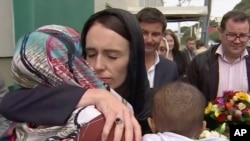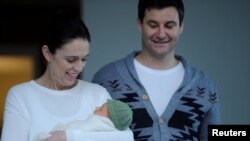On Friday, shortly after news of the mass shooting at two mosques in Christchurch, New Zealand Prime Minister Jacinda Ardern described the incident as one of the country's "darkest days."
Ardern -- at 38, the country's youngest prime minister in 150 years -- has received international praise for her calmness and empathy in responding to the attacks that killed 50 people.
She took office in October 2017 but has had a long history in politics.
Ardern began to turn the Labor party's polling numbers around so fast after becoming its youngest leader that the effect has been dubbed "Jacindamania."
She was born into a Mormon family in the small town of Murupara. She has said seeing the town's Maori children "without shoes on their feet or anything to eat for lunch” was what inspired her to enter public service.
She joined the Labor Party at age 17. She remained active in the party through collage and after graduation landed a job on the staff of Prime Minister Helen Clark, the second woman to hold New Zealand’s highest office and Ardern’s political hero and mentor.
She is seen as as friendly and direct, and promised to be "relentless positivity" during her bid for the country's highest office. Her other campaign promises included three years of free university education, free community-based mental health services, and banning of foreign speculators from buying existing homes in New Zealand.
Her popularity, especially among New Zealand's youth, had the media dubbing her a political rock star, in the mode of Canadian Prime Minister Justin Trudeau and former U.S. president Barack Obama.
She also became something of a feminist icon just hours after being chosen party leader when she slapped down media questions about whether she planned to have children. She said she had previously spoken publicly about the topic.
"But," she said, "it is totally unacceptable in 2017 to say that women should have to answer that question in the workplace. ... It is a woman's decision about when they choose to have children. It should not predetermine whether or not they are given a job, or have job opportunities."
She again captured international attention when she let it be known that she and her live-in partner, TV personality Clarke Gayford, were going to have a baby. She also announced that Gayford would be a stay-at-home dad. She gave birth to her daughter on June 21, 2018.
A month later she announced welfare reforms including a weekly stipend for new parents and an increase in paid parental leave from 18 to 22 weeks.
Former Pakistani Prime Minister Benazir Bhutto is the only other world leader to give birth while in office when she had a baby girl in January 1990.






